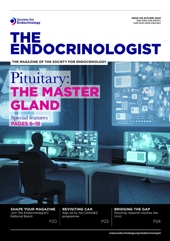Congenital adrenal hyperplasia (CAH) is one of the commonest forms of primary adrenal insufficiency, with an incidence of about 1 in 10,000 to 1 in 15,000. The Congenital Adrenal Hyperplasia Adult Study Executive (CaHASE), supported by the Society for Endocrinology, was formed 20 years ago to study the health status of patients with CAH in adulthood. It is now more than a decade since several studies highlighted the suboptimal health status and care provision among adults with CAH, which were associated with significant co-morbidities at a relatively young age.1–3
CaHASE has become the landmark global study providing information on the health status in adults with CAH.1 The poor health outcomes that were identified by CaHASE were a driver for a new modified release formulation of hydrocortisone that was developed in the UK.4 The CaHASE study also underpinned the development of the I-CAH registry that has resulted in several important insights into CAH around the world.
The key findings of CaHASE can be summarised as follows:1
• Only a minority of adults living with CAH in the UK were under specialist endocrine care.
• Glucocorticoid replacement was generally non-physiological.
• Androgen levels were poorly controlled.
• Patients had adverse metabolic profiles.
• People with CAH showed increased rates of osteoporosis.
• Patients were found to have impaired fertility.
• People with CAH had a reduced quality of life.
Similar findings were reported in a study at the National Institutes of Health2 and in a French cohort study.3 Evidence suggested that poor health outcomes related to treatment rather than genotype.5
TIME FOR AN UPDATE
Considering that recruitment into CaHASE took place in 2003–2007, the data from this study reflect the situation in the UK some 15–20 years ago. In the early 2000s, CAH clinical guidelines6,7 were widely publicised that suggested changes in the use and dosage of corticosteroid replacement in CAH in all age groups. Thus, there is now a generation of young adults with CAH who should have presumably been treated differently during childhood and adolescence than the cohorts who were investigated in the early to mid-2000s.
However, a recent study in children and young people from the UK demonstrates an increased prevalence of problems with growth and weight gain in children with CAH, and suggests reduced quality of life during paediatric care.8,9 Furthermore, a recent international study performed by I-CAH, in combination with members of CaHASE and Endo-ERN, has reported considerable variation in the management of adults with CAH.10
The Society for Endocrinology performed a survey of its members this year, and this has also confirmed variation in clinical care provision among adults with CAH in the UK and Ireland. The majority of respondents managed patients with CAH in general endocrinology clinics. Patients were most commonly seen six-monthly or yearly by different centres, and marked variation was reported with regards to biomarkers that were used for CAH monitoring, including the use of markers that are not commonly recommended by guidelines.11 There was no consensus on the optimal timing for monitoring biochemistry in relation to corticosteroid replacement. A quarter of respondents in specialist clinics used the I-CAH registry and a third of those in general clinics were unaware of this platform.
CaHASE2: A NEW PROGRAMME
We have therefore developed a programme of work:
• to reassess the clinical management and health status of adults living with CAH in the UK and Ireland, 20 years after the first CaHASE study
• to implement a strategy for prospective continuous recruitment with longitudinal data collection in I-CAH
• to identify specific unmet needs, through standardised, deep clinical phenotyping across all participating centres.
The longitudinal data collection will start in November 2023, and 21 centres have already signed up to participate in the study. If you are interested in participating in CaHASE2, please contact the Society for Endocrinology at [email protected].
CaHASE2 STEERING GROUP
Nils Krone (Chair), Faisal Ahmed, Sue Elford, Yasir Elhassan, Lynette James, Sofia Llahana, Michael O’Reilly, Aled Rees, Jeremey Tomlinson
REFERENCES
1. Arlt W et al. 2010 Journal of Clinical Endocrinology & Metabolism 95 5110–5121.
2. Finkielstain GP et al. 2012 Journal of Clinical Endocrinology & Metabolism 97 4429–4438.
3. Bachelot A et al. 2007 Hormone Research 67 268–276.
4. Merke DP et al. 2021 Journal of Clinical Endocrinology & Metabolism 106 e2063–e2077.
5. Krone N et al. 2013 Journal of Clinical Endocrinology & Metabolism 98 E346–E354.
6. Joint LWPES/ESPE CAH Working Group 2002 Journal of Clinical Endocrinology & Metabolism 87 4048–4053.
7. Clayton PE et al. 2002 Hormone Research 58 188–195.
8. Bacila I et al. 2022 European Journal of Endocrinology 187 543–553.
9. Lawrence NR et al. 2023 Journal of Clinical Endocrinology & Metabolism doi: 10.1210/clinem/dgad405.
10. Righi B et al. 2023 Endocrine 80 630–638.
11. Speiser PW et al. 2018 Journal of Clinical Endocrinology & Metabolism 103 4043–4088.





